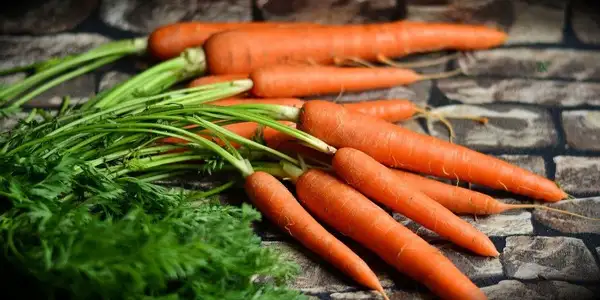
Strengthens the immune systemCarrots are rich in a number of immune system boosting vitamins and antioxidants. The most important of these is beta-carotene, an...
Read more


|
Nutrient |
Per 100 g |
|---|---|
|
Calorific value |
125 kJ |
|
Energy |
50 kcal |
|
Carbohydrates |
2 g |
|
Protein |
2 g |
|
Fat |
0 g |
The food Arugula (fresh) is composed of the following macronutrients.
Arugula, also called rocket, is a healthy and versatile ingredient in the kitchen. Here are some benefits of arugula:
Arugula belongs to the cruciferous family. It has a characteristic spicy, peppery flavor with a slightly bitter note. Arugula is available in many supermarkets and delis and can be purchased fresh or dried.
Arugula can be used in salads, sandwiches, pizza, pasta and other dishes. It is also suitable as a pesto or for flavoring soups and sauces.
Arugula is easy to grow and can be cultivated both outdoors and in a greenhouse. It prefers a sunny location and moist, well-drained soil. Arugula grows quickly and can be harvested after just a few weeks. It is also popular for growing in your own garden.
What is the best way to store arugula?
Arugula should be eaten as fresh as possible, as prolonged storage can compromise its flavor and nutritional content.
Can you grow arugula in the garden?
Arugula prefers a full sun location, but can also thrive in partial shade. Arugula prefers a moist, well-drained soil. Make sure the soil is well drained to avoid waterlogging. Arugula can be planted in both spring and fall. In spring, arugula is pre-planted indoors and then placed outdoors as soon as there is no danger of frost. In the fall, it can be planted directly outdoors. It can be planted close together, but it is better to space the plants about 20 inches apart so they have enough room to grow. Arugula needs water regularly, especially when the plants are growing and flowering. Fertilize arugula every 3 weeks with a nitrogen-rich fertilizer. Arugula can be harvested just a few weeks after sowing. Harvest arugula by plucking off the outer leaves as soon as they are large enough.
What are the arugula varieties?
There are many varieties of arugula, varying in size, color and flavor. Here are some of the most common varieties: arugula selvatica (wild arugula): This variety has a stronger and more intense flavor than common arugula. It has larger and darker leaves with a slightly bitter taste and is good for salads and as a condiment. Arugula di Rughetta (Italian Arugula): This variety has a milder flavor than wild arugula and is most commonly used in Italian cooking. It has smaller and lighter leaves and is excellent for salads and as a pesto. Rucola di Rapa (Rapeseed Arugula): This variety has a strong, slightly bitter flavor. It has larger and longer leaves than common arugula and is often used in Italian cooking. Rucola di Senape (Mustard Rocket): This variety has a sharp, spicy flavor reminiscent of mustard. It has smaller and darker leaves and is great for soups and sauces. Arugula di Scorza (Shelled Arugula): This variety has a milder flavor than regular arugula and smaller, lighter leaves. It is excellent for salads and as a pesto.
I love this app! The food is super varied and filling (and soo delicious!). With one purchase I have the ingredients for a whole week together, thanks to the shopping list. The ingredients are also readily available and not really expensive.
Nicole — App User
The first app in the field of nutrition tips that really convinces me. Updates get minor issues out of the way and new features are added all the time. Top!
Unknown user — App User
ave already tried many nutrition apps but here it is really great and you save a lot of time because you do not have to enter all the meals yourself! 👍👏
Mareen — App User
I don't usually rate apps but this one has to be rated.... I have never had such a great app just fits everything.... The nutrition plans are just absolutely awesome just everything is awesome many many thanks
Mareen — App User
This app is an excellent support for healthy eating even with little time and effort! Super recipes are also included. Highly recommended!
Lennert — App User